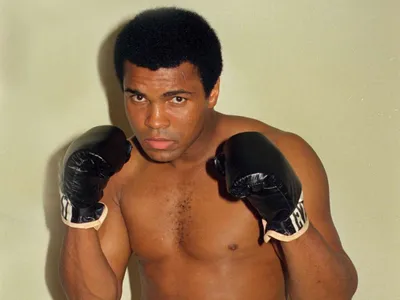amicitaacademy.com – Few athletes in history have left a legacy as profound as Muhammad Ali, not just in the world of boxing but in the broader landscape of sports and society. Born Cassius Marcellus Clay Jr. on January 17, 1942, in Louisville, Kentucky, Ali rose to fame as a boxing icon and became a symbol of resilience, charisma, and social activism. Here’s a look at the life and career of “The Greatest.”
Early Life and Boxing Beginnings
Ali’s journey into boxing began at the age of 12 when his bike was stolen. Furious, he reported the theft to a police officer, who happened to be a boxing coach. The officer suggested Ali learn how to fight, and the rest is history.
Ali quickly rose through the amateur ranks, culminating in a gold medal at the 1960 Rome Olympics in the light heavyweight division. This victory launched him into the professional boxing world, where he would soon make his mark.
Rise to Stardom: The Heavyweight Champion
Ali became a household name after defeating Sonny Liston in 1964 to claim the World Heavyweight Title. At just 22 years old, Ali shocked the world by dominating the fight with his unmatched speed, agility, and confidence. His famous quote, “Float like a butterfly, sting like a bee,” epitomized his unique style in the ring.
Shortly after the fight, Ali announced his conversion to Islam and changed his name from Cassius Clay to Muhammad Ali, symbolizing a new chapter in his life.
Notable Fights and Rivalries
- The Fight of the Century (1971)
Ali faced Joe Frazier in a highly anticipated match, marking his return to boxing after a three-year suspension for refusing the Vietnam War draft. Frazier won the fight, but Ali’s resilience in defeat only strengthened his legendary status. - The Rumble in the Jungle (1974)
Ali took on George Foreman in Zaire (now the Democratic Republic of Congo) in one of the most iconic fights in history. Using his famous “rope-a-dope” strategy, Ali tired out Foreman and delivered a stunning knockout in the eighth round to reclaim the heavyweight title. - Thrilla in Manila (1975)
The third and final bout between Ali and Frazier was an epic, grueling battle in the Philippines. Ali won in the 14th round, later describing it as the toughest fight of his career.
Achievements and Legacy
Ali’s career stats are remarkable: 56 wins, 37 by knockout, and only 5 losses. He became the first boxer in history to win the heavyweight championship three times, a testament to his dominance in the sport.
However, Ali’s impact extended beyond the ring. He was a vocal advocate for civil rights, standing against racism and oppression. His refusal to serve in the Vietnam War, citing religious beliefs and opposition to the conflict, led to widespread controversy but also established him as a figure of moral courage.
Charisma and Influence
Ali’s charisma was unmatched. Known for his quick wit and poetic trash talk, he became a media sensation. Quotes like, “I am the greatest. I said that even before I knew I was,” captured his larger-than-life persona.
His influence transcended sports. Ali inspired millions with his confidence, resilience, and unwavering commitment to his principles. He became a global icon, earning the nickname “The People’s Champion.”
Battling Parkinson’s Disease
In 1984, Ali was diagnosed with Parkinson’s disease, likely a result of the physical toll of his boxing career. Despite his health struggles, Ali remained active in philanthropy and humanitarian efforts, including raising awareness about Parkinson’s.
One of his most memorable moments came in 1996 when he lit the Olympic flame at the Atlanta Summer Games, a powerful symbol of perseverance.
Legacy and Honors
Muhammad Ali passed away on June 3, 2016, but his legacy lives on. He was posthumously celebrated for his contributions to sports, culture, and humanity. Some of his honors include:
- Being named Sportsman of the Century by Sports Illustrated.
- Induction into the International Boxing Hall of Fame.
- Recognition as a global humanitarian and ambassador for peace.
Conclusion
Muhammad Ali was more than a boxer; he was a symbol of courage, determination, and social change. His electrifying performances in the ring, coupled with his fearless advocacy outside of it, cemented his place as one of the most significant figures of the 20th century.
Ali once said, “Service to others is the rent you pay for your room here on earth.” By that measure, Muhammad Ali truly lived a life worth celebrating. He will forever be remembered as The Greatest.

